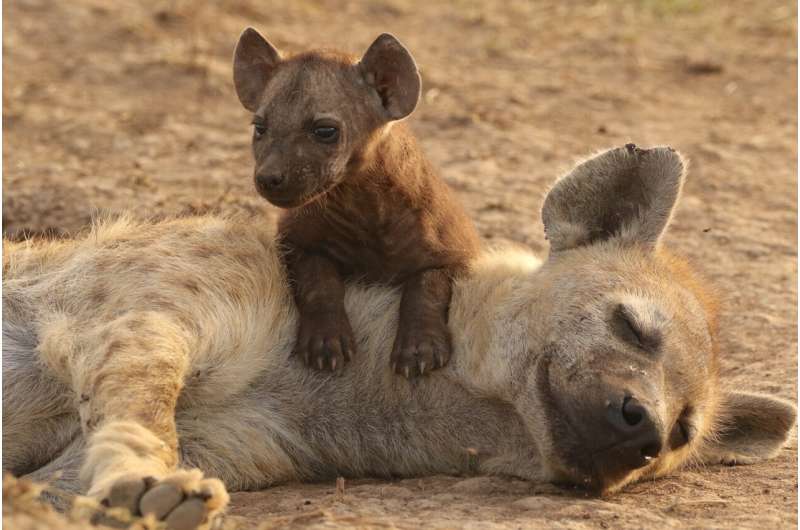Formative years in hyenas: Conditions have long-term effects on health and life expectancy
by Steven Seet, Leibniz-Institut für Zoo- und Wildtierforschung (IZW) im Forschungsverbund Berlin e.V.

A team from the Leibniz Institute for Zoo and Wildlife Research (Leibniz-IZW) has now demonstrated the important influence of maternal, social and ecological factors during early life on survival, longevity and reproductive performance of female adult spotted hyenas: For example, the social status of the mother had a significant, positive effect on the reproduction of the following generation. On the other hand, being born to an elder mother or growing up during a period of increased rainfall reduced survival and longevity. The authors suggest in their paper, published in Journal of Animal Ecology, that the combination of specific conditions during early life may matter more than the simple accumulation of either beneficial or adverse conditions to predict life prospects in wildlife populations.
In a long-term investigation, the scientists from Leibniz-IZW analyzed data from the life histories of 666 female spotted hyenas (Crocuta crocuta) which they studied in the Serengeti National Park in Tanzania from 1987 to 2020. They investigated how certain maternal, social, demographic and ecological factors affect their evolutionary fitness. In doing so, they not only determined the effects of individual factors, but also investigated how the different combinations of circumstances during early life affected life histories and whether several adverse early life conditions have a simple cumulative effect. To measure performance and evolutionary fitness—how many of an individual’s offspring reach reproductive age and thus can pass on its genes to the next generation—they analyzed early growth rate, survival to adulthood, age at first reproduction, longevity and lifetime reproductive success.
“Through careful analyses of the long-term data we were able to show clearly, for example, that female offspring of elder mothers have a significantly shorter lifespan and raise fewer young than those of mothers in their prime age,” says Morgane Gicquel from the Leibniz-IZW, the lead author of the paper that is a part of her dissertation. Daughters benefited if their mother had a high social status as it allowed the daughters to reproduce at a younger age. Singletons and dominant cubs in twin litters had a higher growth rate than subordinate cubs in twin litters. Offspring without siblings also had a higher chance of survival to adulthood than subordinate cubs in twins.
“We were surprised to find that maternal social status, litter size and offspring dominance status only mattered to hyena offspring in the first few years, namely for survival to adulthood and for age at first reproduction, but that they did not influence longevity or lifetime reproductive success,” says Gicquel.
“In contrast, we found both short-term and long-term effects for the number of lactating adult females in a clan,” adds Dr. Sarah Benhaiem from Leibniz-IZW, senior author of the paper. “As the number of lactating female clan members increased, growth rate, survival to adulthood and lifetime reproductive success of the offspring decreased. This could be related to more frequent conflicts and increased competition among breeding females.”
It is not only maternal, social and demographic factors that play a role, but also ecological ones. “For instance, heavy rainfall in the first six months of life reduced the chances of young spotted hyenas surviving to adulthood, possibly owing to increased parasite loads and transmission of pathogens or the flooding of communal dens, leading to cubs drowning,” explains Dr. Marion East from Leibniz-IZW, co-founder of the Serengeti Hyena Project and co-author of the paper.
Co-author, co-founder of the project and Leibniz-IZW director Prof Heribert Hofer adds that “in terms of climate change, it now rains more in the Serengeti than ever before—quite in contrast to many other areas in Africa. In the light of these insights, this might have a long-term negative effect on the population. “
The analyses also showed that specific combinations of maternal, social, demographic and ecological factors experienced during early life by Serengeti spotted hyenas predicted individual life histories and lifetime performance much better than the simple sum of adverse conditions. This suggests that it may not be enough to count the number of adverse conditions—their specific quality may be more important, at least in wildlife species.
Fewer and weaker offspring: Snare injuries decrease reproductive performance of female hyenas in the Serengeti
Morgane Gicquel et al, Early‐life adversity predicts performance and fitness in a wild social carnivore, Journal of Animal Ecology (2022). DOI: 10.1111/1365-2656.13785
Provided by
Leibniz-Institut für Zoo- und Wildtierforschung (IZW) im Forschungsverbund Berlin e.V.
Citation:
Formative years in hyenas: Conditions have long-term effects on health and life expectancy (2022, August 16)
retrieved 16 August 2022
from https://phys.org/news/2022-08-years-hyenas-conditions-long-term-effects.html
This document is subject to copyright. Apart from any fair dealing for the purpose of private study or research, no
part may be reproduced without the written permission. The content is provided for information purposes only.
For all the latest Science News Click Here
For the latest news and updates, follow us on Google News.

